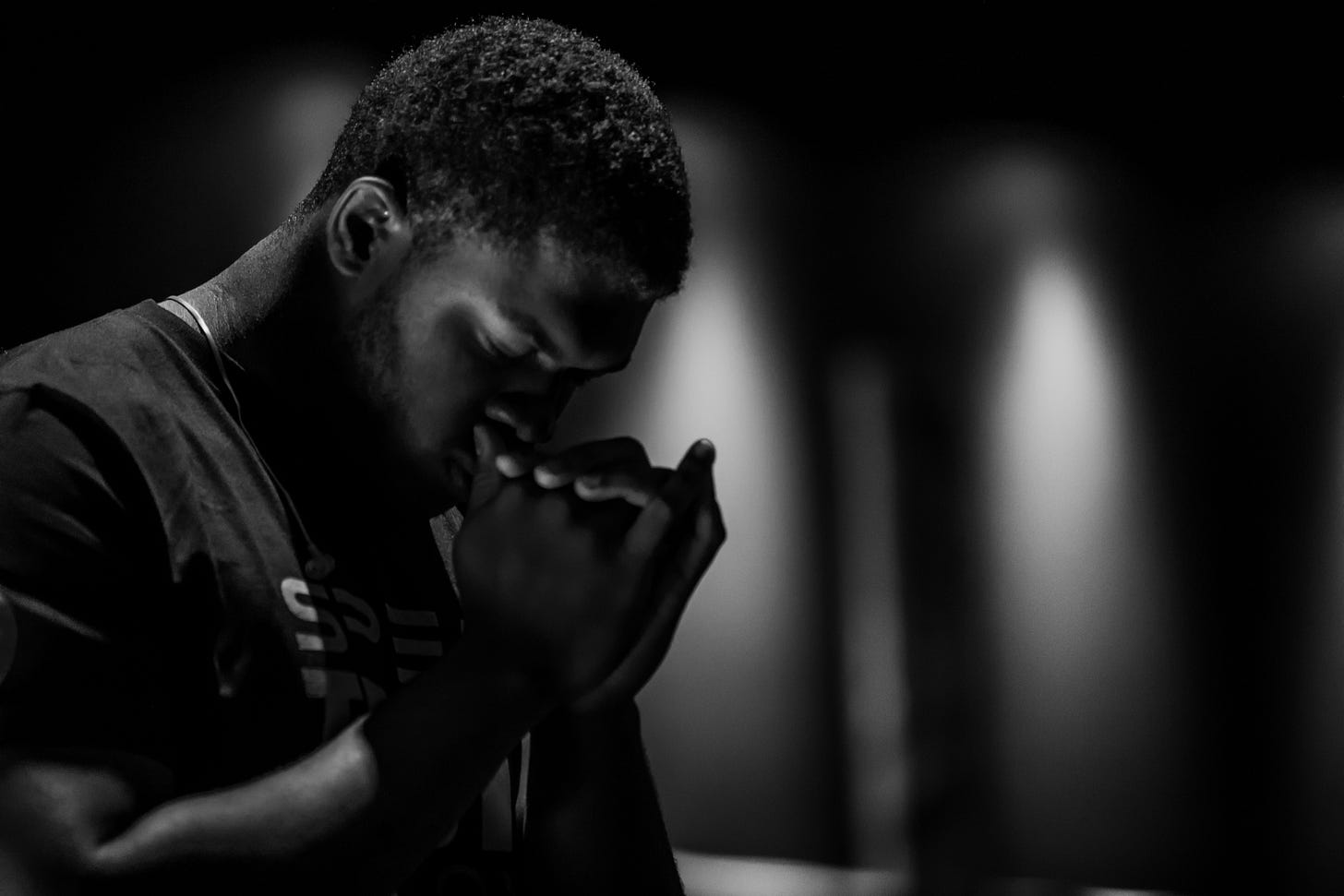
Note: This is the second of two posts in one day - not the usual for me. I’m making two presentations at the Prayer Workshop at Calhoun Church of Christ. These take more the form of notes than complete thoughts. Hope they are a blessing to you.
Audio of the presentation (not just reading the post):
Introduction
"Her absence is like the sky, spread over everything." ~ C.S. Lewis, A Grief Observed.
The Grief Experience is an overwhelming one that touches every area of our lives. There are many kinds of grief.
Loss of a loved one
Loss of a relationship
Loss of status in life, being fired, retiring, transferred, divorced.
Drug addiction, abuse, abandonment - Any loss that causes us to mourn can be called a grief experience.
Grief is an expression of the pain felt at a time of loss. It is common. It is difficult. Zig Ziglar wrote, “No one is immune from the fact of grief. Grief is woven throughout the tapestry of life.” Grief permeates every area of our life - including our faith. When our faith is impacted, so is our prayer life. I’m going to be speaking of grief in terms of losing a loved one who was important in our lives, mostly because that is the primary way I have experienced grief.
As a person of faith, I also have experienced the impact of grief on my prayer life.
1. The Loss of Prayer
One would think that significant loss would drive one to significant prayer. But not always.
“People in deep mourning are among those most likely to give up on prayer. When you mourn, you may feel as though you’ve lost everything. You may think that your prayers for the well-being and healing of the one you’ve lost were not answered. The comfort you may take from knowing your loved one has gone to God can easily be overshadowed by the pain you’re feeling for your loss here and now.” - Alborghetti
The overwhelming emotional pain that grief brings can cloud out many of our normal daily activities - and among those prayer and Scripture reading. We can lose the capacity to function in these areas. The guilt we feel in our failure to practice spiritual disciplines intensifies our guilt and can grind our spiritual life to a halt. This, of course, leaves us vulnerable to the schemes of the Enemy.
Five Areas that leave us struggling to say a prayer.
We can’t explain why God let this happen.
We can’t explain how God let us down by not protecting our loved one.
We can’t process the feeling of abandonment.
We can’t formulate a prayer that addresses our intense pain.
We find it hard to rectify the faith we have and the reality of the loss we are experiencing.
When we are wondering, “Where is God?”, we have a hard time talking to Him.
James 5:13 say, “Is anyone among you suffering? Let him pray.”
2. The Wordless Prayer
Once we regain a desire to pray, that doesn’t mean that the prayers will come out easily. “Oh God” might be all we can get out.
Wordless prayers in Scripture
Hannah moved her lips but could not pray. Hers was not a loss, but a deep grief because she had been unable to have a child. 1 Samuel 12:12-16 “As she kept on praying to the Lord, Eli observed her mouth. 13 Hannah was praying in her heart, and her lips were moving but her voice was not heard. Eli thought she was drunk 14 and said to her, “How long are you going to stay drunk? Put away your wine.” 15 “Not so, my lord,” Hannah replied, “I am a woman who is deeply troubled. I have not been drinking wine or beer; I was pouring out my soul to the Lord. 16 Do not take your servant for a wicked woman; I have been praying here out of my great anguish and grief.”
King David in the loss of two sons, and two different reactions.
When the child born to Bathsheba was dying, “David therefore sought God on behalf of the child. And David fasted and went in and lay all night on the ground. 17 And the elders of his house stood beside him, to raise him from the ground, but he would not,nor did he eat food with them (2 Samuel 12:16-17).” When the child died, “He said, “While the child was still alive, I fasted and wept, for I said, ‘Who knows whether the Lord will be gracious to me, that the child may live?’ 23 But now he is dead. Why should I fast? Can I bring him back again? I shall go to him, but he will not return to me.” (2 Samuel 12:22-23) The grief over the impending death of his child altered David’s life, including his prayers.
Absolom was one of David’s sons who died. A spiteful, rebellious son who would have been happy to see his father dead. When it was reported that he died, David was nearly speechless. (2 Samuel 18:33 “The king then became very upset. He went up to the upper room over the gate and wept. As he went he said, “My son, Absalom! My son, my son, Absalom! If only I could have died in your place! Absalom, my son, my son!”.”)
When Jesus heard of the death of his cousin John, he “withdrew from there in a boat to a deserted place by himself…” (Matthew 14:13)
When we are in grief, our prayer life is impacted greatly. Sometimes driving us to wordless prayers.
Augustine wrote, “To pray much is to knock for Him to Whom we pray. This is often done more by groans than speeches, by weeping than by addresses.”
Liquid Prayers - God sees each tear. (Psalm 56:8 You have kept count of my tossing; put my tears in your bottle. Are they not in your book?)

3. The Wilderness of Prayer
Grief makes it hard to think clearly. We wander in our prayers (more than usual). Dwight L. Moody spoke of a time in the wilderness of prayer. “It was the darkest hour of my life; relief came in prayer. God heard my cry, and enabled me to say, from the depth of my soul, ‘Thy will be done.’”
Some of our prayers wander into the wilderness of anger. Can we express this to God?
Abroghetti: “Prayer is a conversation with God, and it assumes that God hears us even when we may not be ready to admit it … It’s okay to be upset with God. He can take it. And that’s the important thing to know: that God is big enough to take our anger.”
Abroghetti: “After a significant loss, feelings of disbelief or numbness, anger (both at God and at everything associated with the loss - including the loved one), abandonment, loneliness, and confusion are all common.”
We have to realize that this is a long-term struggle and not one that is just going away quickly.
4. Regaining Our Prayer Footing.
Prayers from friends, praying for us, supporting us in our time of great grief. Intercessory prayer is much needed, when we cannot pray well for ourselves.We need friends to move beyond “bless them” to asking the Lord on our behalf for what we need.
Prayers of the Bible give us great examples. When we do not have our own words, we can pray the words of Biblical revelation. The Psalms are excellent resources for prayers in all kinds of painful situations. Yea, though I walk through the valley of death, I will fear no evil…(Psalm 23). The Lord’s Prayer. N. T. Wright says that The Lord’s Prayer “...grows directly out of what Jesus was doing in Galilee. And Gethsemane, too: the prayer looks directly forward to what he achieved in his death and resurrection. The prayer is therefore a way of saying to the Father: Jesus has…caught me in the net of his good news. … I want to be a part of his kingdom-movement. ….Most of the things we might want to pray about are taken care of within that prayer.” They help us formulate expressions of prayer that we cannot invent on our own.
Prayers of pleading, seeking God’s healing of our pain.
Prayers of others who have struggled. N. T. Wright wrote, “How many times have I been grateful, faced with nightfalls both metaphorical and literal, for the old Anglican prayer which runs:
Lighten our darkness, we beseech thee, O Lord; and by thy great mercy defend us from all perils and dangers of this night; for the love of thy only son, our Saviour Jesus Christ, Amen.
Write said, “I didn’t write it, but whoever did has my undying gratitude. It’s just what I wanted.” There are many prayers in prayer books that can relate to our grief.
What Happens When We Don’t Pray? (Stanley)
Prayerlessness - When we don’t pray, we will become more anxious about things, and more fearful of things.
Burden Bearing - The person who doesn’t pray can feel as if he were carrying the weight of the world. The person who bears burdens in his own strength has a heavy heart.
Weariness - We can be so overwhelmed by the sorrows, problems, and anxieties of our lives that we become almost paralyzed - have no energy to exert for God at all.
Weakness - When a person becomes discouraged and weary - spiritually, emotionally, or physically - he is in state of weakness. And the weaker a person becomes, the more he will focus on himself, his needs, and his failures or “lack” in some area of life.
Don’t leave your home in the morning, don’t do your job, don’t go to sleep at night, without talking to the Lord.

5. God in our Time of Grief
He is present. God is there all along in the journey.
He is merciful. He remembers we are dust. Psalm 103:14 “for he knows how we are formed, he remembers that we are dust.”
He is graceful.
He is compassionate.
He is with us. He watched his son die on the cross, he knows what grief feels like.
He is forgiving.
He is strong when we are weak. He can take our lament. He has heard many of His people raise up prayers of protest. (Job, Jeremiah, Elijah)
He is helpful - the Holy Spirit helps us with prayers we cannot utter. Romans 8:26 says, “In the same way, the Spirit helps us in our weakness. We do not know what we ought to pray for, but the Spirit himself intercedes for us through wordless groans.”
He is listening. Jesus intercedes for us. “When any needy heart begins to truly pray, heaven itself stirs in response.” - Jim Cymbala
“Jesus fully comprehends our agony at the death of a loved one. He grieves with us.” -Alborghetti
He wept at the tomb of Lazarus.
He was moved to raise the only son of a widow . (Luke 8:12-15)
“Time and again, Scripture shows us that the Lord comprehends the abyss of human grief, and yet in our own grief, we often forget how deeply God commiserates with us.” - Alborghetti
He is loving.
“When the doubts creep in and the fears debilitate, I remember the cross of Jesus Christ. I can stand beside the coffin of my wife and doubt God’s love, but I cannot kneel at the foot of the cross and doubt it. God has offered me an indubitable testimony of his love. Despite all the contrary witnesses that fill a fallen world, God entered history and demonstrated his love for us in the incarnation, ministry, death, and resurrection of Jesus Christ.” -John Mark Hicks
“There is no pit so deep that God’s love is not deeper still.” - Corrie ten Boom
Conclusion
Sylvester Horne was a much-beloved teacher in a small American college. Quite often in his classes he spoke to the students of certain high thoughts which came to him while walking in his garden. One night some of his students were invited to his home for a meal. Afterwards they asked if they might see his garden, for he had spoken so often of it, and so many great thoughts had come to him while he was there. When they saw it they could only stare. It was so plain, and very, very ordinary; and there was altogether only a few square feet of grass. One of the boys said, “Your garden, sir, it’s so small…” Dr. Horne smiled as he looked at their surprised faces and said, “Yes, it is very tiny, but see how high it goes.” And the students realized that it was not outward, but upward, that his thoughts went. May God grant to us that upward look, that we, in our sorrow and hardships, might perceive eternity beyond this life, and that for us some day, as well as for our loved ones, the words of Jesus might be fulfilled. “He that believes in me, though he were dead, yet shall he live.” (Watt)
Prayer by William Penn (1644-1718):
“We give back to you, O God, those whom you gave to us. You did not lose them when you gave them to us, and we do not lose them by their return to you. Your Son has taught us that life is eternal and love cannot die. So death is only a horizon, and a horizon is only the limit of our sight. Open our eyes to see more clearly, and draw us closer to you, so that we may know we are nearer to our loved ones, who are with you. You have told us that you are preparing a place for us: prepare us that where you are we may be always, O dear Lord of life and death.” (Via Ashwin)
“The tender heart of Jesus waits to hear our griefs; let us pour them into His patient ear.” - Charles H. Spurgeon
Resources
Alborghetti, Marci. How To Pray When You Think You Can’t. Guideposts, 2007.
Ashwin, Angela. The Book of a Thousand Prayers. Zondervan, 2002.
Hicks, John Mark. Yet Will I Trust Him: Understanding God in a Suffering World. College Press, 1999.l
Stanley, Charles F. When The Enemy Strikes. Nelson, 2004.
Watt, J. Robert. Let Not Your Heart Be Troubled: Comfort For the Bereaved. Abingdon, 1957.
Wright, N. T. Simply Christian: Why Christianity Makes Sense. Harper, 2006.
Subscribe for Free to Sermon & Class Notes from John Dobbs:
Observations, photography, miscellany from John Dobbs:






A great many helpful thoughts, John. I am not walking in grief, but uncertainty. Have been on surer footing in the past, but find myself more drifting. Thank you for the good thoughts to unpackage.
Thank you for this message on prayer through grief. You, your church and its GriefShare ministry helped me “pick up” my prayers again. ✨